After 20 years, Swiss skiers find their peaks
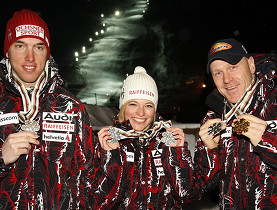
The Alpine Ski World Championships have ended in Val d'Isère, France, where the Swiss team usurped Austria for the first time in a decade to win the most medals.
All tallied Swiss skiers raced their way to six podium slots – two gold, three silver and one bronze – surpassing the goal they had set for themselves of coming home with five, an ambitious plan with just 11 events.
Austria took second on the medal table with five, followed by the United States with three. All of the top three teams had two gold medals each.
For the Swiss, it was Carlo Janka, Lara Gut and Didier Cuche who carried the victory with two medals each. The team had a strong showing in speed events but struggled in the slaloms.
That was the case once again on Sunday, when all but one Swiss skier – Sandro Viletta of canton Graubünden – skied out or crashed during the men’s slalom. He finished in 13th place, well behind Austrian Manfred Pranger who won the two-run contest with a combined time of one minute, 44.17 seconds.
“That’s unfortunately a reflection of our season,” said Patrice Morisod, a Swiss team trainer. “A difficult course like this doesn’t forgive anyone.”
It wasn’t just the Swiss who suffered down the steep Bellvarde face. Nearly 70 per cent of the field did not finish the race.
For the Swiss, that was neither new nor surprising. The team has had problems at slalom events in Adelboden and Zagreb earlier this year, when no Swiss skier made it to the second round.
In fact, in the last 30 years, the team has only won two slalom medals: Zurbriggen’s silver in 2003 in St Moritz and Michael von Grunigen’s bronze in 1996 in the US. During that same time, the team has won 34 medals in speed events.
Finding the line
It took some 20 years for the Swiss team to revamp itself as a dominant force on the ski circuit, and the formidable showing at Val d’Isere over the last two weeks helps slay the ghost of the country’s dismal performance in Bormio in 2005, where not a single medal was won.
The last time the team seemed so strong at the World Championships was back in 1989 in Vail, Colorado, where the powerhouses were folks like Pirmin Zurbriggen, Vreni Schneider, Maria Walliser and Paul Accola. This time that duty fell to Cuche, Gut and Janka.
Not to forget, though, that in some ways, it was Daniel Albrecht’s brilliant performance in Åre, Sweden, two years ago that helped marked the revival of the Swiss ski team at the prestigious world event. He came home with two of the five individual medals at the World Championships there.
The 25-year-old racer was noticeably absent from this year’s championships. He missed defending his combined event title while lying in an artificial coma at an Austrian hospital after he suffered head and lung injuries during a training run in Kitzbühel.
Three weeks later he is awake, stable and expected to make a full recovery.
A quiet force
For his part, Carlo Janka proved himself to be more expansive on the slopes than before interviewers’ microphones. Two months earlier he’d won the giant slalom gold on the same Bellvarde piste, where he’d set his heart on seizing the world title.
He did take gold at the World Championships in the giant slalom, followed by a bronze in the downhill. The latter was perhaps more astonishing since he raced the course in swirling fog and yet missed the gold by a mere 0.17 seconds. Who knows, but maybe the Iceman, as he’s known for his calm demeanour, could have erased that deficit under blue skies.
The performances in combined events were exceptional all the same. And with a bit of luck – perhaps in the form of 0.01 seconds – they could have been more fruitful still. Silvan Zurbriggen missed a medal in the super-combined by just a fraction of a second.
On the list of disappointments among the men you might also see Didier Défago’s name. After his two consecutive victories in Wengen and Kitzbühel, he crashed in Val d’Isère during the downhill. He was not hurt.
So Gut so great
At the heart of the women’s team, weaned off medals at the last two World Championships, it was teenager Gut who stole the show.
With two silver medals in the super-combined and the downhill, the 17-year-old skier from canton Ticino continues to show she could be well on her way into the hall of greats.
Without her, the women’s team would have once again come home empty-handed. Hopefuls like Fabienne Suter and Dominique Gisin, who came to the French resort with two consecutive World Cup victories, were unable to bring a medal home.
Yet Gut was not without her problems. A virus left her doubled over in pain before and after runs. Without the stomach cramps, it’s very possible she could have snatched a third medal.
Once again observers were left impressed with how the young skier could perform under pressure, even under the constant gaze of the cameras.
“They’ve been following me everywhere since arriving in Val d’Isère,” she said after being eliminated from a race. “Sometimes it’s burdensome. I still have to learn how to manage all the perks of the championships.”
swissinfo, based on an article in French by Samuel Jaberg
(Gold, Silver, Bronze)
1. Switzerland (2,3,1)
2. Austria (2,1,2)
3. United States (2,0,1)
4. Germany (2,0,0)
5. Canada (1,0,1)
The Alpine World Ski Championships take place every two years. For 15 days, skiers compete for medals in the same disciplines as in the World Cup.
A contest among nations, the event is divided into men’s and women’s events.
This year the races took place from February 2-15 at the French ski resort of Val d’Isère. It is the first time that France has organised the championships since 1968.
1. Manfred Pranger, Austria, 1 minute, 44.17 seconds
2. Julien Lizeroux, France, 1:44.48
3. Michael Janyk, Canada, 1:45.70
4. Felix Neureuther, Germany, 1:45.89
5. Mattias Hargin, Sweden, 1:46.23
6. Steve Missillier, France, 1:46.46
7. Patrick Thaler, Italy, 1:46.54
8. Krystof Kryzl, Czech Republic, 1:46.57
9. Urs Imboden, Moldova, 1:46.72
10. Jimmy Cochran, United States, 1:46.83
11. Lars Elton Myhre, Norway, 1:47.46
12. Alexandr Horoshilov, Russia, 1:47.95
13. Sandro Viletta, Switzerland, 1:48.96

In compliance with the JTI standards
More: SWI swissinfo.ch certified by the Journalism Trust Initiative
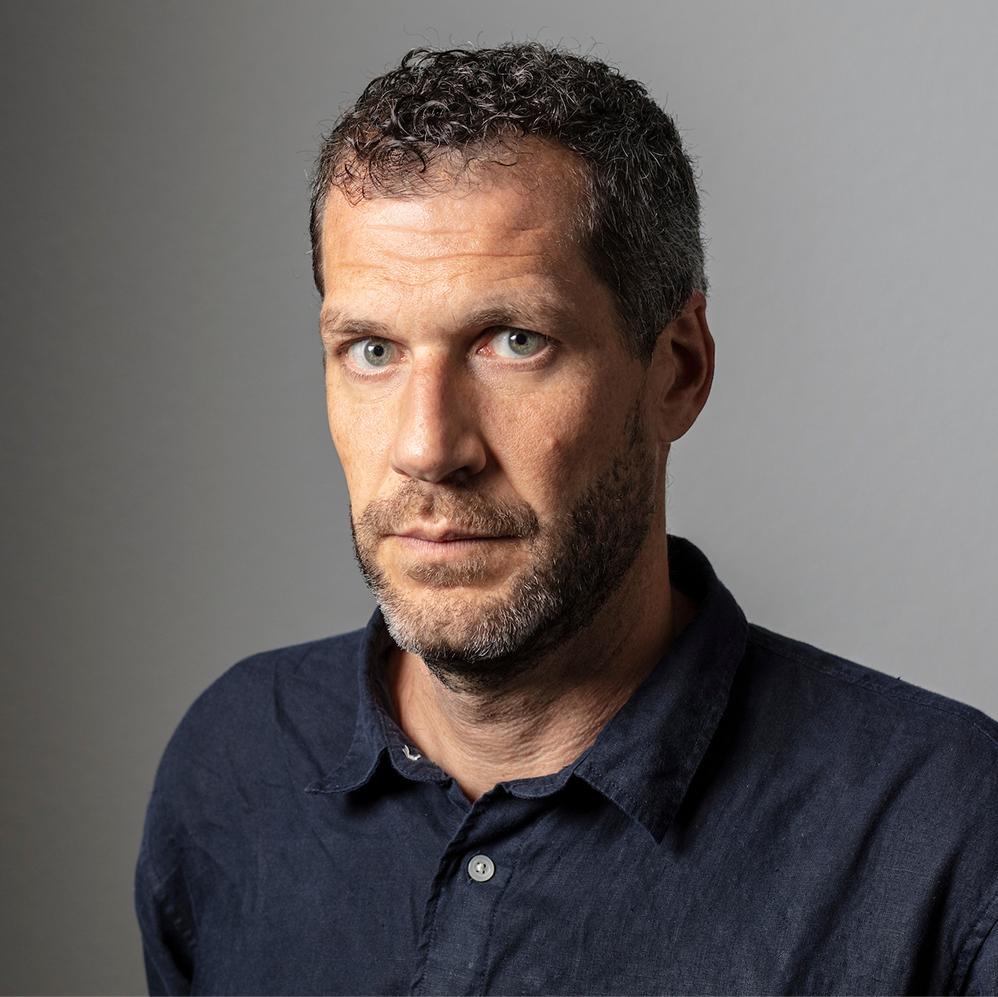

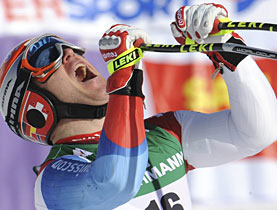
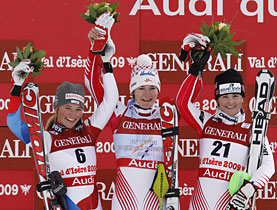
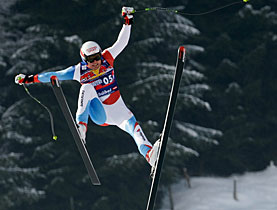
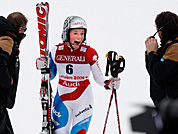
You can find an overview of ongoing debates with our journalists here. Please join us!
If you want to start a conversation about a topic raised in this article or want to report factual errors, email us at english@swissinfo.ch.